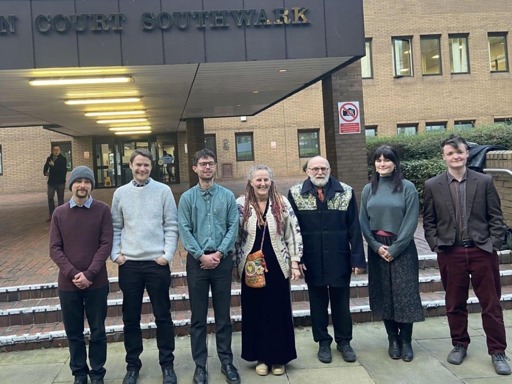A court has found six Just Stop Oil supporters guilty of public nuisance for an action in which they peacefully climbed gantries on the M25 in 2022, to demand an end to new fossil fuel projects. The sentence follows a skewed trial where the judge denied them all legal defences. Throughout, the prosecution also confronted the activists with barefaced climate denial.
Just Stop Oil M25 protest: found guilty of public nuisance as the world burns
Cosmo Cattell, Adelheid Russenberger, Jane Touil, Andrew Dames, Clara O’Callaghan and Michael Dunk took action on the M25 on 8 November 2022. They were among scores of Just Stop Oil supporters who climbed on gantries that week. They did so in order to sound the alarm about the government’s plan to licence over 100 new oil and gas projects against all expert advice.
After an eight day trial before judge Perrins, the jury found them guilty of intentionally or recklessly causing a public nuisance. Sentencing will be on 5 December.
During the trial, the judge ruled out all legal defences. Notably, this included the statutory defence of ‘reasonable excuse’, as well as the defences of necessity, Articles 10 and 11 of the European Convention on Human Rights, and implied consent. In ruling out the defence of reasonable excuse, judge Perrins said:
This is a court of law, not a court of morals. Even if you took the view that each defendant genuinely believed that they were morally justified in acting in the way that they did, that does not provide them with a defence to the charge of public nuisance.
Prosecution peddling climate denial
In a break from every previous Just Stop Oil trial for gantry actions on the M25, the prosecution refused to agree to any facts on the climate crisis to be included in evidence. Agreed facts exist precisely to establish the uncontested backdrop against which actions are judged, and in climate cases they frame the defendants’ motivations within the scientific consensus. By excluding them, the Crown Prosecution Service (CPS) is not only stripping away essential context but effectively denying reality itself.
In his closing speech Cosmo Cattell, 27, a philosophy student from Somerset said:
I want to make this very clear to the jury. Our intention and our aim was not to disrupt the public. Our intention and our aim was to prevent harm, to try and prevent the new round of oil licensing in the North Sea, which as I have said in my evidence I see as a transgression by the government of our rights to life.
Only in this context does our action make any sense. We had to stop this harm. The prosecution has repeatedly asked us why we could not pursue legal routes, why we could not run for election for instance? I’m afraid we simply did not have time. We are already on borrowed time. This was, as acts of non-violent direct action should always be, a last resort. It was the only way we could think of to stop this massive harm from happening at a government level.
Following the verdict, Jane Touil, 59, a visually impaired former crown servant from Rochdale said:
Today I have been criminalised using legislation brought in by the last Conservative government to make effective protest illegal.
No court of morals could ever convict climate activists
34-year history PhD student Adelheid Russenberger from London said:
The judge directed the jury that this was a Court of Law, not a Court of Morals, because no court of morals could convict us. I would rather be convicted in a court of law than to endure the shame of abandoning that basic moral principle of protecting life. I leave this court with my head held high.
Echoing this, Clara O’Callaghan, 21, a recent graduate from Edinburgh added:
I respect the jury’s decision to find us guilty, but I stand by my actions, I would rather be moral than lawful. When faced with the decimation of everything I love, and so much suffering across the globe, I might not be able to do much, but I refuse to do nothing.
Michael Dunk, 71, a modelmaker and local councillor from Frome,Somerset said:
I was privileged to be able to protest on behalf of my children and grandchildren and all those who were unable to do so. The policy of the government to issue new licences for oil and gas exploration in the North Sea was not compatible with the UK aim to keep global warming to below 1.5 degrees. As Sir David Attenborough said: ‘if we don’t act now, it will be too late.’
Andrew Dames, 63, a quaker, engineer, and father of four from Cambridge said:
We thank the jury, their hands were tied. Our government’s continued commitment to No New Oil, that we and the country asked for – that is all that matters.
Feature image supplied
By The Canary
From Canary via this RSS feed


